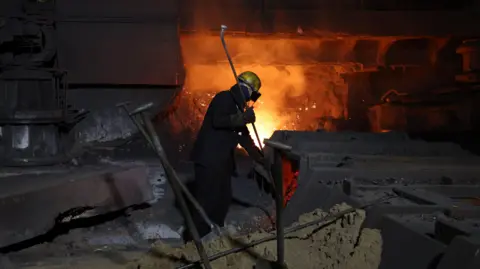In a significant turn of events for the UK steel industry, the redundancy consultation that threatened approximately 2,700 jobs at British Steel has been officially halted following a government-led intervention. This development comes as the company has come under the control of the government, which aims to stabilize operations and secure the future of steel production at the Scunthorpe site.
British Steel, once a privately owned entity, faced mounting challenges that put its workforce at substantial risk. The process of redundancy consultation was initially launched by the previous management team earlier this year, with plans to downsize the workforce significantly due to financial strains and operational uncertainties. However, the current management, under government oversight, has decided to withdraw the applications associated with this process, marking a pivotal step towards stabilizing the company’s future.
Lisa Coulson, who serves as the interim chief commercial officer at British Steel, acknowledged the period of uncertainty that employees and their families have endured during the redundancy process. The announcement that the consultation will not continue came with relief, as it was confirmed that essential supplies of raw materials for production have been secured. This ensures that both the Queen Anne and Queen Bess blast furnaces at the Scunthorpe site can operate continuously without interruptions.
In her remarks, Ms. Coulson expressed gratitude towards the trade unions for their professionalism and support throughout the crisis. She praised the dedication and hard work of the British Steel employees, declaring that their commitment is what makes steelmaking in Scunthorpe have a promising future. These sentiments were echoed by Industry Minister Sarah Jones, who celebrated the announcement, viewing it as a measure that would provide long-term security for the staff involved.
The cessation of the redundancy process has been received positively across the community, with Charlotte Brumpton-Childs of the GMB Union describing the development as “fantastic news” for both the steelworkers and the surrounding populace. She remarked, “It’s like a cloud has been lifted from above the whole community.” Such comments emphasize the critical role that British Steel plays not only in the economy but also in the social fabric of Scunthorpe, where employment opportunities are vital.
Amidst these developments, British Steel also indicated a shift in operational processes by stating that it would no longer need to implement the “salamander tap,” a technique traditionally used to temporarily shut down a blast furnace. This indicates a further commitment to ensuring uninterrupted production cycles, as the company seeks to enhance its efficiency and reliability.
The decision to stabilize operations reflects a careful strategy to maintain the viability of the steelworks, which had been facing significant pressure prior to government intervention. The management’s commitment to improving working conditions and securing materials highlights a determined approach to ensuring that the historic Scunthorpe site can continue to be a central hub of steel production in the UK for years to come.
Overall, the withdrawal of the redundancy plans marks a hopeful chapter for British Steel, its employees, and the local economy of Scunthorpe. With ongoing support from the government, trade unions, and the workforce’s dedication, there is a strong sentiment that the company is poised to navigate the uncertainties of the steel market and emerge as a formidable player in the industry.



